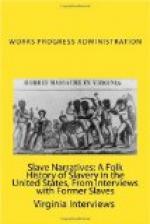“Uncle Rezin”, by which name some called him, since slavery days, was, besides being engaged in preaching the Gospel, journeying from one town to another, where he has performed hundreds of marriages among his race, baptised thousands, performed numerous christenings and probably preached more sermons than any Negro now living. He preached his last sermon two years ago. He says his life’s work is now through and he is crossing over the River Jordan and will soon be on the other side. Since the Civil War he has made extra money for his support during depression times by doing odd jobs of whitewashing, serving as a porter or janitor, cutting wood, hauling and running errands, also serving as a teamster, picking berries and working as a laborer. He has had several miraculous escapes from death during his long life. Twice during the past quarter of a century his home at Mount Winans has been destroyed by fire, when firemen rescued him in the nick of time, and some years ago, when he was suddenly awakened during a severe windstorm, his house was unroofed and blew down. When workmen were clearing away the debris in search for “Uncle” Rezin, some hours later, a voice was heard coming from a large barrel in the cellar. It was from Williams, who somehow managed to crawl in the barrel during the storm, and called out: “De Lord hab sabed me. You all haul me out of here, but I’se all right.” Scabo, his pet dog, was killed by the falling debris during the storm. Firemen at Westport state that three years ago, when fire damaged “Uncle” Rezin’s home, the aged negro preacher refused to be rescued, and walked out of the building through stifling smoke, as though nothing had happened. When veterans of a great war have been mowed down by the scythe of Father Time until their numbers are few, an added public interest attaches to them. Baltimore septuagenarians remember the honor paid to the last surviving “Old Defenders”, who faced the British troops at North Point in 1814, and now the few veterans of the War of Secession, whether they wore the blue or the gray, receive similar attention. A far different class, one peculiarly associated with the strife between the North and the South, are approaching the point of fading out from the life of today—the old slaves, and original old freemen. “Parson” Williams tops the list of them all.



